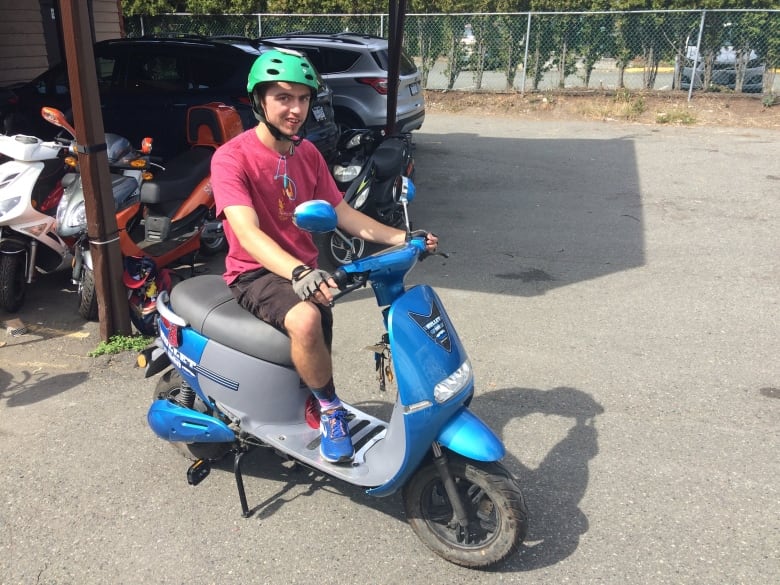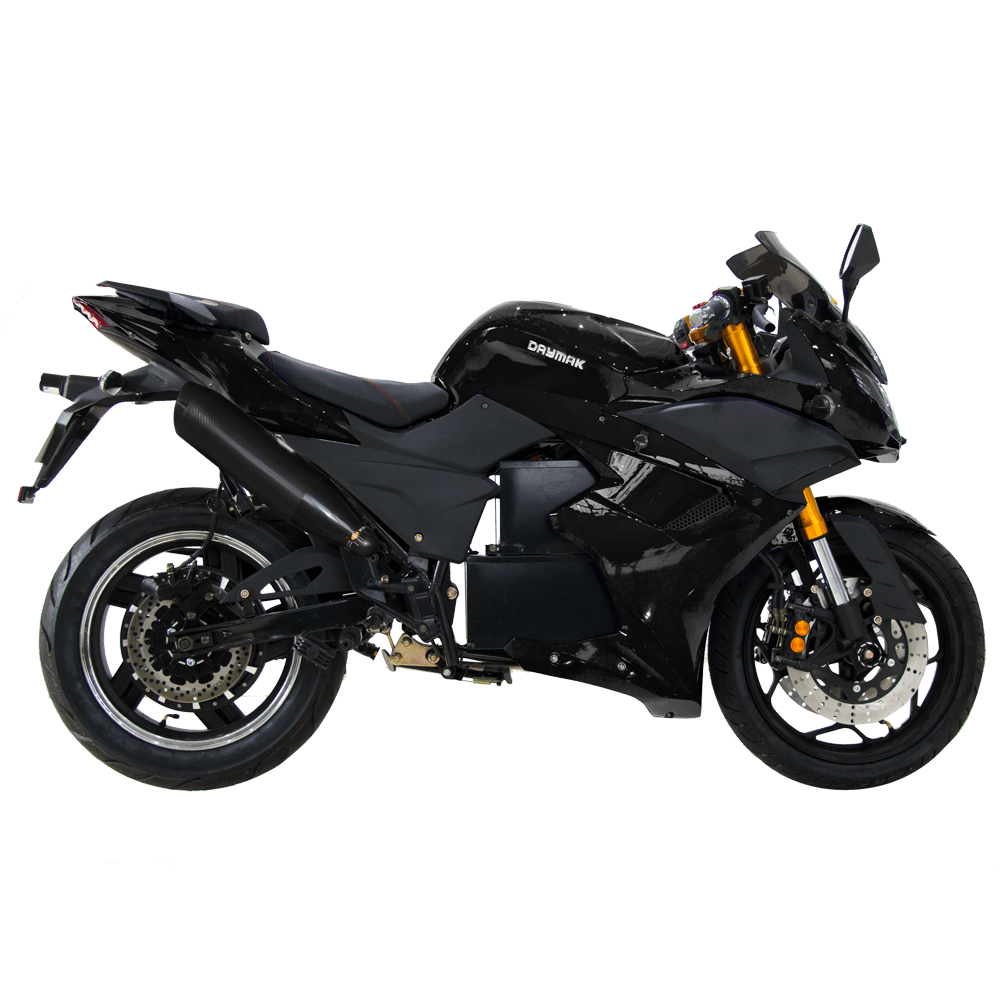Cyclists getting ticketed for no insurance blame confusing e-bike legislation
Source: https://www.cbc.ca/news/canada/brit...-blame-confusing-e-bike-legislation-1.5278601
But RCMP say people should educate themselves on the law before buying motor-assisted cycles
Adam van der Zwan · CBC News · Posted: Sep 15, 2019 8:00 AM PT | Last Updated: September 15

E-cyclists in Greater Victoria say they're being unfairly ticketed by the RCMP for not having insurance on a type of e-bike that shouldn't require it. (Michael McArthur/CBC)
College student Jason McCracken bought his electric bike last year to save money and, he says, act in a more environmentally conscious manner.
But this summer he was hit with nearly $600 in RCMP tickets and towing fees for failing to obtain insurance — even though ICBC does not offer insurance for his particular kind of bike.
"I'm just worried if I go back to college with my e-bike, they'll give me ... maybe 10 tickets in a row," he said.
While McCracken's bike looks like a scooter, ICBC defines it as a "motor-assisted cycle," which needs to be equipped with bicycle-style pedals, have a maximum motor speed of 32 km/h and an electric motor of 500 watts or less.
ICBC's website says insurance and a licence are only required for e-bikes classified as limited speed motorcycles or scooters, which do not have pedals and run at speeds of up to 70 km/h.
McCracken is one of three Victoria e-cyclists CBC spoke to who say the Integrated Road Safety Unit has been unfairly doling out tickets for no insurance.
Kelly Goldbeck from KGeez Cycle store in Victoria says there are far more of his customers than that being unfairly ticketed and he's fed up with it.
"You can ride them just like a bicycle in the bike lanes," he said.

Jason McCracken now faces nearly $600 in RCMP tickets and towing fees for not pedalling his motor-assisted cycle with the throttle on. The RCMP's traffic unit says, if the pedals are not being used, an e-bike is considered a motor vehicle under the law and needs to be insured. (Adam van der Zwan/CBC)
'A lot of confusion out there'
But officers with the Integrated Road Safety Unit in Greater Victoria say these kinds of e-bikes are a nuisance when it comes to enforcing a clear law that cyclists need to be aware of.
IRSU commander Sgt. Ron Cronk said while many of these bikes are built with a throttle to allow cyclists to coast without pedaling, B.C.'s regulations say motors are meant only to "assist the pedaller."
Section 3(2) of B.C.'s Motor Assisted Cycle Regulation says "the motors of a motor assisted cycle must turn off or disengage if the operator stops pedalling, an accelerator is released or a brake is applied."
"If you can start from a stop [by] twisting the throttle and not pedaling, you are now considered a [Class 5] motor vehicle, and the bike has to be registered and insured," said Cronk.
"There's certainly a lot of confusion out there," said Cronk. "Dealerships that are selling these things need to be regulated, because they're giving misinformation."
E-cyclist wins in court
But the court has, in some cases, been hesitant to side with the police when it comes to addressing the confusion around cycling regulations.
Local cyclist Evan Laine took his ticket to traffic court in June where Justice Hunter Gordon waived the no-insurance fee, after learning that ICBC wouldn't insure Laine's bike.
"It strikes me as the wrong application of the law to require someone to be insured that couldn't be … even if they wanted to," Gordon concluded in a recording of the hearing.
Laine said ICBC's website was confusing and contradictory to the way the RCMP interpret the law, as it says "it is not necessary to always be pedalling" a motor-assisted bike.

ICBC's website says while they may appear the same, motor-assisted cycles are different from scooters or limited speed motorcycles by virtue of their pedals, maximum speed and power source. (Screenshot courtesy of the ICBC website)
'Just electric scooters with pedals'
At the end of the hearing, Const. Mike Christians, who issued Laine's ticket, responded to the judge's decision.
"My enforcement pattern likely will not change as a result of the court findings today," he said.
Christians told the judge that motor-assisted cycles are "just electric scooters with … pedals attached that don't actually do anything."
"What part of this vehicle is a bicycle?" he said, adding he saw the bikes as an "attempt to bypass the law."
Christians cited a similar case in 2012, where the judge ruled in the police's favour. But that judge also suggested the regulations be reviewed as e-bikes become more popular.

RCMP Const. Mike Christians said in a court hearing last June that he felt many motor-assisted cycles are 'just electric scooters with pedals' that were created in an 'attempt to bypass the law.' (Mike McArthur/CBC)
ICBC is misleading, lawyer says
B.C. lawyer Paul Hergott, who researched the issue in 2013, said police are interpreting the law correctly, but the explanation on ICBC's website is misleading for cyclists who rely on it for the rules.
"There needs to be clarity," said Hergott. "The government has not stepped in to prevent this problem."
Hergott suggested that a e-bike sellers be required to give information handouts to those purchasing the bikes and that the legislation be revised to reflect how e-bikes actually operate.
A Ministry of Transportation document on its new active transportation strategy says "the Motor Vehicle Act was identified as a key piece of legislation that needs to be updated to include … new mobilities (such as e-bikes and scooters)."
A ministry statement says "the Province is currently evaluating the legislative, regulatory and policy frameworks" for e-bikes.
Source: https://www.cbc.ca/news/canada/brit...-blame-confusing-e-bike-legislation-1.5278601
But RCMP say people should educate themselves on the law before buying motor-assisted cycles
Adam van der Zwan · CBC News · Posted: Sep 15, 2019 8:00 AM PT | Last Updated: September 15

E-cyclists in Greater Victoria say they're being unfairly ticketed by the RCMP for not having insurance on a type of e-bike that shouldn't require it. (Michael McArthur/CBC)
College student Jason McCracken bought his electric bike last year to save money and, he says, act in a more environmentally conscious manner.
But this summer he was hit with nearly $600 in RCMP tickets and towing fees for failing to obtain insurance — even though ICBC does not offer insurance for his particular kind of bike.
"I'm just worried if I go back to college with my e-bike, they'll give me ... maybe 10 tickets in a row," he said.
While McCracken's bike looks like a scooter, ICBC defines it as a "motor-assisted cycle," which needs to be equipped with bicycle-style pedals, have a maximum motor speed of 32 km/h and an electric motor of 500 watts or less.
ICBC's website says insurance and a licence are only required for e-bikes classified as limited speed motorcycles or scooters, which do not have pedals and run at speeds of up to 70 km/h.
McCracken is one of three Victoria e-cyclists CBC spoke to who say the Integrated Road Safety Unit has been unfairly doling out tickets for no insurance.
Kelly Goldbeck from KGeez Cycle store in Victoria says there are far more of his customers than that being unfairly ticketed and he's fed up with it.
"You can ride them just like a bicycle in the bike lanes," he said.

Jason McCracken now faces nearly $600 in RCMP tickets and towing fees for not pedalling his motor-assisted cycle with the throttle on. The RCMP's traffic unit says, if the pedals are not being used, an e-bike is considered a motor vehicle under the law and needs to be insured. (Adam van der Zwan/CBC)
'A lot of confusion out there'
But officers with the Integrated Road Safety Unit in Greater Victoria say these kinds of e-bikes are a nuisance when it comes to enforcing a clear law that cyclists need to be aware of.
IRSU commander Sgt. Ron Cronk said while many of these bikes are built with a throttle to allow cyclists to coast without pedaling, B.C.'s regulations say motors are meant only to "assist the pedaller."
Section 3(2) of B.C.'s Motor Assisted Cycle Regulation says "the motors of a motor assisted cycle must turn off or disengage if the operator stops pedalling, an accelerator is released or a brake is applied."
"If you can start from a stop [by] twisting the throttle and not pedaling, you are now considered a [Class 5] motor vehicle, and the bike has to be registered and insured," said Cronk.
"There's certainly a lot of confusion out there," said Cronk. "Dealerships that are selling these things need to be regulated, because they're giving misinformation."
E-cyclist wins in court
But the court has, in some cases, been hesitant to side with the police when it comes to addressing the confusion around cycling regulations.
Local cyclist Evan Laine took his ticket to traffic court in June where Justice Hunter Gordon waived the no-insurance fee, after learning that ICBC wouldn't insure Laine's bike.
"It strikes me as the wrong application of the law to require someone to be insured that couldn't be … even if they wanted to," Gordon concluded in a recording of the hearing.
Laine said ICBC's website was confusing and contradictory to the way the RCMP interpret the law, as it says "it is not necessary to always be pedalling" a motor-assisted bike.

ICBC's website says while they may appear the same, motor-assisted cycles are different from scooters or limited speed motorcycles by virtue of their pedals, maximum speed and power source. (Screenshot courtesy of the ICBC website)
'Just electric scooters with pedals'
At the end of the hearing, Const. Mike Christians, who issued Laine's ticket, responded to the judge's decision.
"My enforcement pattern likely will not change as a result of the court findings today," he said.
Christians told the judge that motor-assisted cycles are "just electric scooters with … pedals attached that don't actually do anything."
"What part of this vehicle is a bicycle?" he said, adding he saw the bikes as an "attempt to bypass the law."
Christians cited a similar case in 2012, where the judge ruled in the police's favour. But that judge also suggested the regulations be reviewed as e-bikes become more popular.

RCMP Const. Mike Christians said in a court hearing last June that he felt many motor-assisted cycles are 'just electric scooters with pedals' that were created in an 'attempt to bypass the law.' (Mike McArthur/CBC)
ICBC is misleading, lawyer says
B.C. lawyer Paul Hergott, who researched the issue in 2013, said police are interpreting the law correctly, but the explanation on ICBC's website is misleading for cyclists who rely on it for the rules.
"There needs to be clarity," said Hergott. "The government has not stepped in to prevent this problem."
Hergott suggested that a e-bike sellers be required to give information handouts to those purchasing the bikes and that the legislation be revised to reflect how e-bikes actually operate.
A Ministry of Transportation document on its new active transportation strategy says "the Motor Vehicle Act was identified as a key piece of legislation that needs to be updated to include … new mobilities (such as e-bikes and scooters)."
A ministry statement says "the Province is currently evaluating the legislative, regulatory and policy frameworks" for e-bikes.



